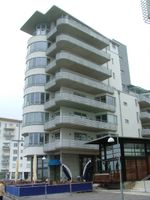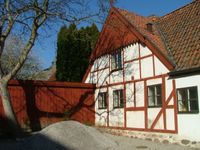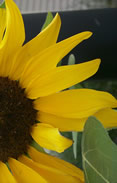Yesterday it just dawned on me that I will never ever adapt or integrate or belong (call it what you want) in the Swedish society. It is simply so very different not just from my culture (because this can change over time) but also from my personality, from the way I am... I will never fit in, never understand or more importantly never like "their" ways. A cold polite arrogance - that is what I get as the main feature of Swedish social behavior (except when alcohol is involved). A distant political correctness that covers up feelings of superiority and a super-exclusivist attitude. Blah!
I wonder if there is a place on this Earth where I can imagine myself as "fitting". Certainly not Romania, where I feel almost as much an outsider as here... The US... Maybe, not as a whole, but in its special parallel universes. That is what I liked about the US, the fact that you could create your own special society, your "bubble", and that you could live all your life surrounded by people and things that you more or less chose. The US is big enough for everybody - a platitude, yes, but nevertheless an accurate description. But then you don't actually live in the reality, you have some form of extended "ivory tower" - and perhaps this is lacking authenticity.
Or maybe there is some other spot on this planet that I have not yet visited and that would immediately feel like home. In fact, I believe that for the most part home is in one's head (except for situations of extremely adverse social conditions).
Friday, May 27, 2005
Thursday, May 26, 2005
Boat Owners
Martin's lifelong dream of owning a boat finally came true yesterday, when "Flamman" ("The Flame") became ours. It needs a lot of repairs, it is small and we don't know how to attach the mast to it (as of now), but it is ours and we love it. You are now presented with additional incentives to come and visit us on the West Coast of Sweden, famous for its archipelago! Let us hope for good weather!
Thursday, May 19, 2005
Books: Latest Readings
I have meant to write down something about my readings for quite a while, but everytime I remembered to do it, I realized that I have not brought the book with me and I could not include some of my favorite quotations. Now this problem is solved, as I have packed away ALL my books, so bringing them anywhere is out of the question.
So, I decided to write down a couple of impressions about the books, with the quotations postponed until better, more stable times.
Eric Orsenna - "Madame Ba". Indeed, a great piece of writing, and, to my shame, one of the very few about Africa on my list. Conceived as a request for a French visa (and following the form's itemized questions), the book is the biography of a strong Malinese woman who has an astounding energy and an acute sense of observation. Her life, from the childhood spent near a mystical mother and a rationalist father, to the old age (she is a grandmother, although she does not feel drained of power), is depicted as to explore both the personal and the general; both the individual and the political and cultural background. A very critical but also loving portrait of a person and of a country.
J. M. Coetzee - "Youth". Although I really like the surgical quality of Coetzee's writing, I felt that "Youth", describing the life of a young computer engineer and poet wanna-be, is simply too dry. It is a novel where nothing happens, where the main character does not evolve, except perhaps to get deeper and deeper into misery, a key word in the text. Trying to escape his family and the feeling of marginality, a young South African emmigrates to London at the beginning of the '60s, but fails to become a poet (his secret ambition) and, despite his feeble attempts at romantic love, ends up disabused and lonely, a small cog in a big machinery he cannot control. Very well done, I thought, the feeling of displacement and isolation of the colonial exile as well as the atmosphere of the work environment in a 1962 IBM programming office.
Khaled Hosseini - "The Kite Runner". Supposedly the first Afghani novel accessible in English, "The Kite Runner" has very high but also very low points. On the positive side, the portait of Kabul before the Russian invasion, as well as during the Taliban regime, feels very real and moving. One can smell the food, see the houses, hear the conversations, get excited about the children's games, feel the fear of locals in face of the acts of random violence. The main characters are also made of flesh and bones, and are far from being perfect incarnations of generalized human types.
However, the plot itself, about a young Afghani who recalls his childhood and his betrayal of his best friend from an exile position in the US, has many artificial twists and turns and seems forced in its quest for a moral ending. Although the adventures grab you and keep you interested, some of the symbolism is simply over the top. Making exception of these moralizing attempts, the book is very readable and opens up a universe as of yet less explored.
So, I decided to write down a couple of impressions about the books, with the quotations postponed until better, more stable times.
Eric Orsenna - "Madame Ba". Indeed, a great piece of writing, and, to my shame, one of the very few about Africa on my list. Conceived as a request for a French visa (and following the form's itemized questions), the book is the biography of a strong Malinese woman who has an astounding energy and an acute sense of observation. Her life, from the childhood spent near a mystical mother and a rationalist father, to the old age (she is a grandmother, although she does not feel drained of power), is depicted as to explore both the personal and the general; both the individual and the political and cultural background. A very critical but also loving portrait of a person and of a country.
J. M. Coetzee - "Youth". Although I really like the surgical quality of Coetzee's writing, I felt that "Youth", describing the life of a young computer engineer and poet wanna-be, is simply too dry. It is a novel where nothing happens, where the main character does not evolve, except perhaps to get deeper and deeper into misery, a key word in the text. Trying to escape his family and the feeling of marginality, a young South African emmigrates to London at the beginning of the '60s, but fails to become a poet (his secret ambition) and, despite his feeble attempts at romantic love, ends up disabused and lonely, a small cog in a big machinery he cannot control. Very well done, I thought, the feeling of displacement and isolation of the colonial exile as well as the atmosphere of the work environment in a 1962 IBM programming office.
Khaled Hosseini - "The Kite Runner". Supposedly the first Afghani novel accessible in English, "The Kite Runner" has very high but also very low points. On the positive side, the portait of Kabul before the Russian invasion, as well as during the Taliban regime, feels very real and moving. One can smell the food, see the houses, hear the conversations, get excited about the children's games, feel the fear of locals in face of the acts of random violence. The main characters are also made of flesh and bones, and are far from being perfect incarnations of generalized human types.
However, the plot itself, about a young Afghani who recalls his childhood and his betrayal of his best friend from an exile position in the US, has many artificial twists and turns and seems forced in its quest for a moral ending. Although the adventures grab you and keep you interested, some of the symbolism is simply over the top. Making exception of these moralizing attempts, the book is very readable and opens up a universe as of yet less explored.
Tuesday, May 17, 2005
Politics: Uzbekistan killings
Under the pretext of anti-extremism from Islamic groups, it seems that many a government takes action against its opponents. Most recently, the leaders of the former Soviet Republic of Uzbekistan, turned democrats but only in name, decided to accuse 23 business people of unlawful activities related to pro-Islamic movements and, when protests ensued, to brutally execute the people taking part in the manifestation. The reaction of the authorities is hugely disproportionate in comparison to the size and importance of the protest, the brutality of the police looks almost maladive; according to the BBC, "troops were still shooting injured people dead three and a half hours after the gunfire began". More than 600 victims have been counted so far, and the number is increasing as the government slowly releases more and more bodies.
I wonder if the leaders in Tashkent really thought that they can get away with it, without anybody paying attention... Or if they calculated that these days everything can be explained away or blamed on some form of Islamic terrorists... Hopefully Islam (!) Karimov will be proven wrong and his uncontested dictatorial reign will come to an end.
I wonder if the leaders in Tashkent really thought that they can get away with it, without anybody paying attention... Or if they calculated that these days everything can be explained away or blamed on some form of Islamic terrorists... Hopefully Islam (!) Karimov will be proven wrong and his uncontested dictatorial reign will come to an end.
Friday, May 13, 2005
Holocaust Memorial, Berlin
I must say I am quite disappointed by the new Holocaust Memorial inaugurated recently in Berlin. First, it is a bit sad that the only victims commemorated are the "murdered Jews" - there are so many left out, the political adversaries of the Nazis, the Gypsies, the homosexuals, so it feels incomplete and exclusivist.
Second, from an artistic point of view it is a disaster... I don't know what is the logic of memorial buildings, but I think an esthetic element should be at least partially considered (and they surely left that out for this monument!). I know that one is not supposed to feel elated at the sight of a monument erected in the memory of a barbarian event, but nevertheless one should not feel apalled by it - otherwise people would not want to look at it closely, they would be pushed away, rejected... Or maybe this is the point, that visitors should be disgusted by it?
Finally, the memorial is so ugly that it really spoils the central Berlin landscape. Could not have they made it something better? Something that would address the sad memories without being an eyesore?
Second, from an artistic point of view it is a disaster... I don't know what is the logic of memorial buildings, but I think an esthetic element should be at least partially considered (and they surely left that out for this monument!). I know that one is not supposed to feel elated at the sight of a monument erected in the memory of a barbarian event, but nevertheless one should not feel apalled by it - otherwise people would not want to look at it closely, they would be pushed away, rejected... Or maybe this is the point, that visitors should be disgusted by it?
Finally, the memorial is so ugly that it really spoils the central Berlin landscape. Could not have they made it something better? Something that would address the sad memories without being an eyesore?
Thursday, May 05, 2005
Belated Happy Orthodox Easter!
I have been absent from the blog for sooooo long that did not even write Happy Easter to everybody!! Christos a Inviat!!!
The Valborgsafton
I survived quite well the crazy day of the Valborgsafton (here in Sweden everything is celebrated in the eve of the event, therefore the "afton" which means literally "eve"). During the day, the city park was invaded by young people celebrating the first day of picnic by drinking non-stop lots and lots of alcohol...
In the afternoon, in front of one important university building, the Lund Student Choir sang melodies in the honor of spring. One specific sign that the warm season arrived finally is the blooming magnolia tree - so very pretty! At the end of the miniconcert, the current and former students were allowed to wear again the student cap, looking quite different from the American one... My words fail me in trying to describe this, so I will try to attach some pics.
And in the evening each and every one in town gathered together with friends (typically around barbecues) and had a party of their own.
In the afternoon, in front of one important university building, the Lund Student Choir sang melodies in the honor of spring. One specific sign that the warm season arrived finally is the blooming magnolia tree - so very pretty! At the end of the miniconcert, the current and former students were allowed to wear again the student cap, looking quite different from the American one... My words fail me in trying to describe this, so I will try to attach some pics.
And in the evening each and every one in town gathered together with friends (typically around barbecues) and had a party of their own.
Subscribe to:
Comments (Atom)














